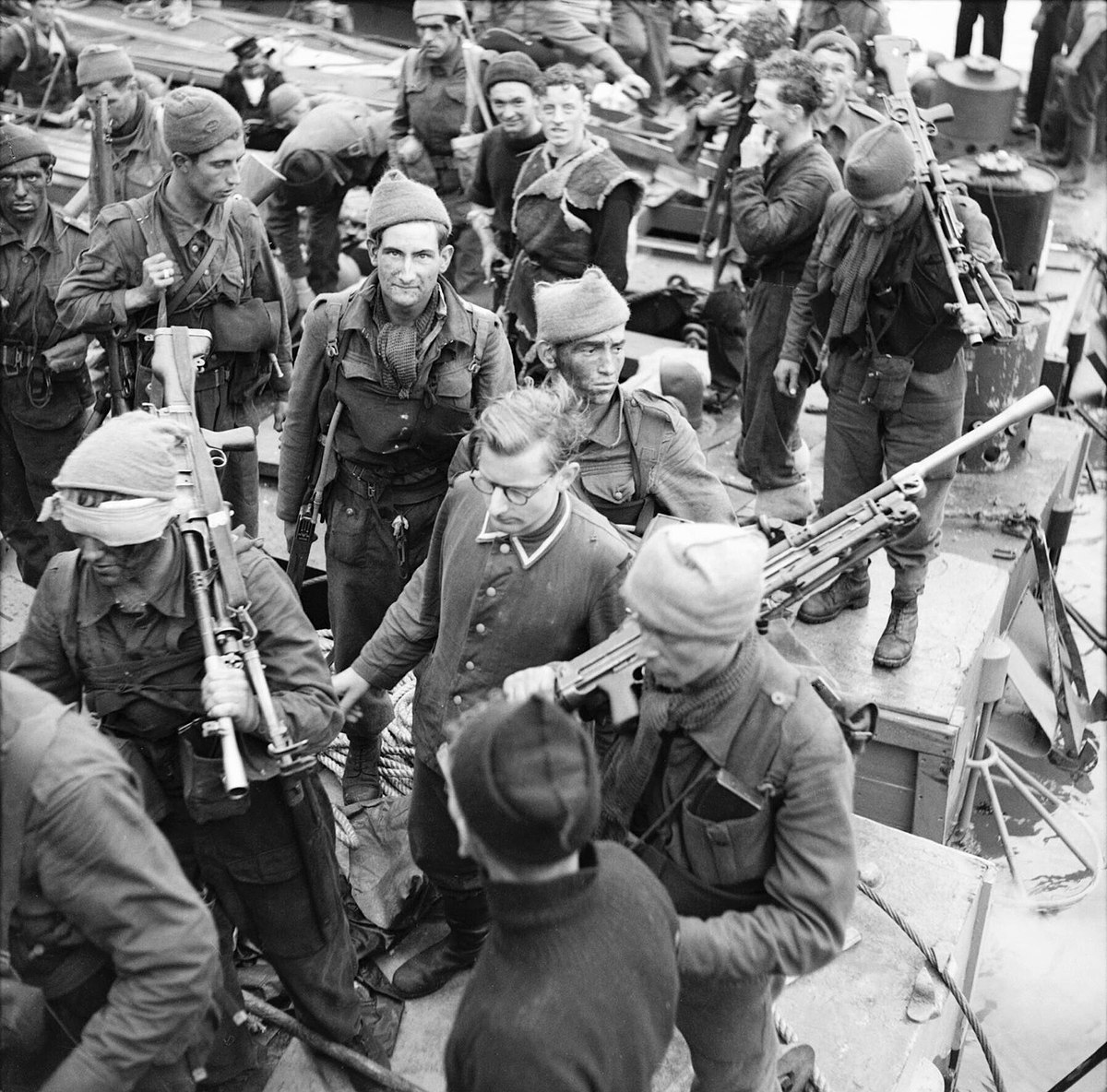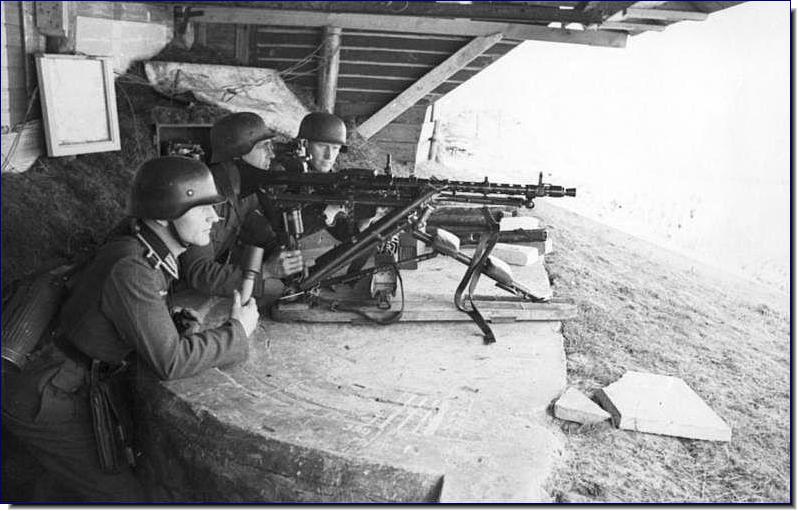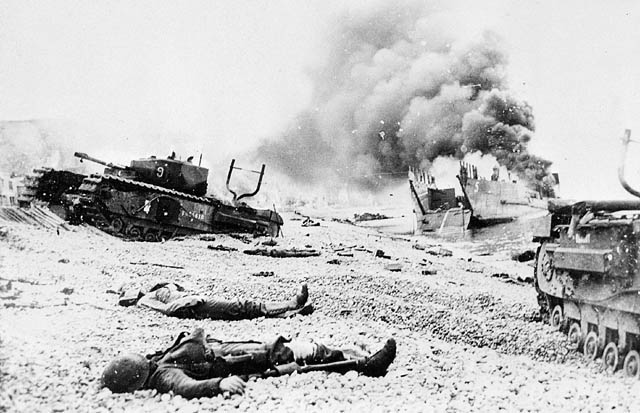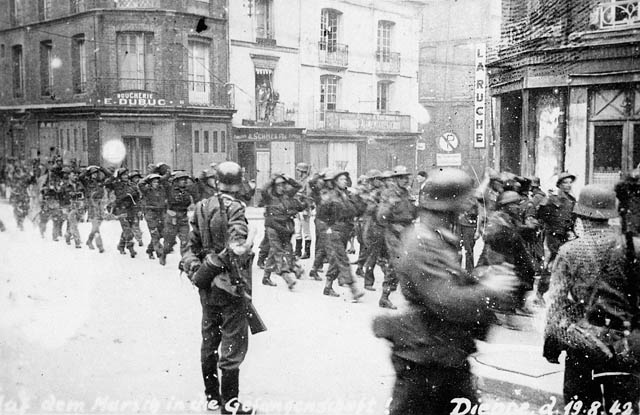
 Jacques Pauwels
Jacques Pauwels
August 19, 1942, 80 Years Ago
Landing craft draw away from main gunboat during Operation Jubilee (Raid on Dieppe)
The tide of World War II turned in early December 1941, when a counter-offensive of the Red Army in front of Moscow signaled the failure of Hitler’s Blitzkrieg strategy. That setback doomed Nazi Germany to lose a war it had to fight without the benefit of Caucasian oil and other resources it had hoped to gain through a speedy victory over the Soviet Union. The war was far from over, however, and for the time being the Red Army continued to do battle with its back to the wall, so to speak. Material help from the United States and Great Britain was forthcoming, but what the Soviets really needed from their allies was effective military assistance. And so Stalin asked Churchill and Roosevelt to open a second front in Western Europe. An Anglo-American landing in France, Belgium, or Holland would have forced the Germans to withdraw troops from the Eastern Front, and would therefore have afforded the Soviets much-needed relief.
In Great Britain and in the USA, which had entered the war only recently, in December 1941, political and military leaders were divided with respect to the possibilities and the merits of a second front. A number of British and American army commanders – including the American chief of staff, George Marshall, as well as General Eisenhower – wanted to land troops in France as soon as possible. They enjoyed the support of President Roosevelt, at least initially. He had promised Churchill that the United States would give priority to the war against Germany, and would settle accounts with Japan later; this decision became known as the “Germany First” principle. Consequently, Roosevelt was eager to deal with Germany right away, and this task required opening a second front. In May 1942 Roosevelt promised the Soviet minister of foreign affairs, Molotov, that the Americans would open a second front before the end of the year.
British Prime Minister Winston Churchill, on the other hand, was an outspoken opponent of a second front. He may have feared, as some historians suggest, that a landing in France might lead to a duplication of the murderous warfare associated with the battlefields of northern France in the First World War. But it is more likely that Churchill liked the idea that Hitler and Stalin were administering a major bloodletting to each other on the Eastern Front, and that he believed that London and Washington would benefit from a stalemated war in the East. Since he already had nearly three years of war experience, Churchill had much influence on Roosevelt, a newcomer to the war in Europe. It is therefore understandable that the opinion of the British leader ultimately prevailed, and that plans for opening a second front in 1942 were quietly discarded. In any event, Roosevelt himself discovered that this course of action – or rather, inaction – opened up some attractive prospects.
For example, it allowed him, in spite of the “Germany First” principle, to quietly commit a high proportion of manpower and equipment to the war in the Pacific, which was very much “his” war, and where American interests were more directly at stake than in Europe. He and his military and political advisors also started to realize that defeating Germany would require huge sacrifices, which the American people would not be delighted to bring. Landing in France was tantamount to jumping into the ring for a face-off with a formidable German opponent, and, even if ultimately successful, that would be a bloody and costly affair. Was it not far wiser to stay safely on the sidelines, at least for the time being, and let the Soviets slug it out against the Nazis?
With the Red Army providing the cannon fodder needed to vanquish Germany, the Americans and their British allies would be able to minimize their own losses. Better still, they would be able to build up their strength in order to intervene decisively at the right moment, like a deus ex machina, when the Nazi enemy and the Soviet ally would both be exhausted. With Great Britain at its side, the USA would then be able to play the leading role in the camp of the victors, to act as supreme arbiter in the sharing of the spoils of the supposedly common victory, and to create a “new order” of its liking in Europe. In the spring and summer of 1942, with the Nazis and Soviets locked in a titanic battle, watched from a distance by the “Anglo-Saxon” tertius gaudens, it did indeed look as if such a scenario might come to pass. (Incidentally, the hope for a long, drawn-out conflict between Berlin and Moscow was reflected in numerous American newspaper articles and in the much-publicized remark already uttered by Senator Harry S. Truman on June 24, 1941, only two days after the start of the Nazi attack on the Soviet Union: “If we see that Germany is winning, we should help Russia, and if Russia is winning, we should help Germany, so that as many as possible perish on both sides.”)
Of course, the Americans and the British could not reveal the true reasons why they did not wish to open a second front. Instead, they pretended that their combined forces were not yet strong enough for such an undertaking. It was said then – and it is still claimed now – that in 1942 the British and Americans were not yet ready for a major operation in France. Allegedly, the naval war against the German U-boats first had to be won in order to safeguard the required transatlantic troop transports. However, troops had been successfully ferried from North America to Great Britain for quite some time, and in the fall of that same year the Americans would experience no trouble whatsoever landing a sizable force in distant North Africa, on the same side of the admittedly dangerous Atlantic Ocean. (These landings, known as Operation Torch, involving the occupation of French colonies such as Morocco, did not force the Germans to transfer troops from the Eastern Front, did not provide any relief to the Soviets, and can therefore not be construed as the opening of a second front.)
In reality, it was already possible in the summer of 1942 to land a sizable force in France or elsewhere in Western Europe and open a second front. The British army had recuperated from the troubles of 1940, and large numbers of American and Canadian troops had joined them on the British Isles and were ready for action. Furthermore, it was not a secret that the Germans only had relatively few troops available to defend thousands of kilometres of Atlantic coast, and these troops also happened to be of considerably inferior quality compared to their forces on the Eastern Front. On the Atlantic coast, Hitler had about 60 divisions at his disposal, which were generally deemed to be second-rate, while no less than 260 German divisions did battle in the East. It is a fact, furthermore, that on the French coast in 1942 the German troops were not yet as strongly entrenched as they would be later, namely, at the time of the landings in Normandy in June 1944; the order to build the fortifications of the famous Atlantic Wall was only given by Hitler in August 1942, and the construction would drag on from the fall of 1942 until the spring of 1944.

Canadian infantrymen disembark from a landing craft in England during a training exercise before Operation Jubilee, the Raid on Dieppe, France, in August 1942 (MIKAN 3194482)
Stalin, who knew that the German defences in Western Europe were weak, continued to press London and Washington for a landing in France. Churchill also experienced considerable domestic pressure in favour of a second front, for example from members of his own cabinet, such as Richard Stafford Cripps, and particularly from the side of the trade unions, whose members were sympathetic to the plight of the Soviets. Thankfully, relief from this relentless pressure came suddenly to the British Prime Minister in the form of a tragedy that appeared to demonstrate conclusively that the Western Allies were not yet able to open a second front: on August 19, 1942, a contingent of Allied soldiers, sent on a mission from England to the French port of Dieppe, seemingly in an effort to open some sort of “second front,” were tragically routed there by the Germans.
Of the total of 6,086 men who made it ashore, 3,623 – almost 60 percent – were either killed, wounded, or captured. The British Army and Navy suffered approximately 800 casualties, and the RAF lost 106 aircraft. The 50 American Rangers who participated in the raid had 3 casualties. But the bulk of the losses were suffered by Canadian troops, with nearly 5,000 men the bulk of the entire force; no less than 3,367 of them – 68 percent! – became casualties; about 900 were killed, nearly 600 were wounded, and the rest were taken prisoner. Of losses such as these, it is traditionally considered that they were “not in vain”; but unsurprisingly, the media and the public wanted to know what the objectives of this raid had been, and what it had achieved, especially in Canada. However, the political and military authorities only provided unconvincing explanations, though these duly found their way into the history books. For example, the raid was presented by Churchill as a “reconnaissance in force,” as a necessary test of the German coastal defences. But did one really have to sacrifice thousands of men to learn that the Germans were strongly entrenched in a seaport surrounded by high cliffs, in other words, in a natural fortress? In any event, crucial information such as the location of pillboxes, cannon, and machine gun positions could have been gleaned through aerial reconnaissance and through the services of local resistance fighters.
Talking about the Résistance, the raid was also purported to boost the morale of the French partisans and the French population in general; if so, it was unquestionably counterproductive. Indeed, the outcome of the operation, an ignominious withdrawal from a beach littered with abandoned equipment and corpses, and the sight of exhausted and dejected Canadian soldiers being marched off to a POW camp, was not likely to cheer up the French. If anything, the affair provided grist for the propaganda mill of the Germans, allowing them to ridicule the incompetence of the Allies, boast of their own military prowess, and thus dishearten the French while giving a lift to Germany’s own civilians, who were very much in need of some good news on account of the constant flow of bad tidings from the East.
Last but not least, Operation Jubilee was also claimed to have been an effort to provide some relief to the Soviets. It is obvious, however, that Dieppe was merely a pinprick, unlikely to make any difference whatsoever with respect to the fighting on the Eastern Front. It did not cause the Germans to transfer troops from the East to the West; on the contrary, after Dieppe the Germans could feel reasonably sure that in the near future no second front would be forthcoming, so that they actually felt free to transfer troops from the west to the East, where they were desperately needed. To the Red Army, then, Dieppe brought no relief.
Historians have mostly been happy to regurgitate the official rationalizations of Jubilee, and in some cases they have invented new ones. Just recently, for example, the Dieppe raid was proclaimed to have been planned also, if not primarily, for the purpose of stealing equipment and manuals associated with the Germans’ Enigma code machine, and possibly even all or parts of the machine itself. But would the Germans not immediately have changed their codes if the raid had achieved that objective? (The argument that the plan was to secretly steal the Enigma material, and that that the raiders would have blown up the installations prior to withdrawing from Dieppe, thus destroying evidence of the removal of Enigma equipment, is unconvincing, because it presupposes a high degree of naivety on the part of the Germans.)
After the June 1944 allied landings in Normandy, code-named Operation Overlord, an ostensibly convincing rationale for Operation Jubilee was concocted. The Dieppe Raid was now triumphantly revealed to have been a “general rehearsal” for the successful Normandy landings. Dieppe had supposedly been a test of the German defences in preparation for the big landing yet to come. Lord Mountbatten, the architect of Jubilee, who was – and continues to be – blamed by many for the disaster, thus claimed that “the Battle of Normandy was won on the beaches of Dieppe” and that “for every man who died in Dieppe, at least 10 more must have been spared in Normandy in 1944.” A myth was born: the tragedy of Jubilee had been the sine qua non for the triumph of Overlord.
A very important military lesson had allegedly been learned at Dieppe, namely, that the German coastal defences were particularly strong in and around harbours. It was for this reason, presumably, that the Normandy landings took place on the harbourless stretch of coastline north of Caen, with the Allies bringing along an artificial harbour, code-named Mulberry. But was it not self-evident that the Germans would be more strongly entrenched in seaports than in insignificant little beach resorts? Had it really been necessary to sacrifice thousands of men in order to learn that lesson? And one must also wonder whether information, obtained from a “test” of the German coastal defences in the summer of 1942, was still relevant in 1944, especially since it was mostly in 1943 that the formidable Atlantic Wall fortifications had been built. If Dieppe was a “general rehearsal,” why was the main event not staged until two years later? Is it not absurd to proclaim Jubilee as a rehearsal for an operation that had not even been conceived yet? Finally, the advantage of lessons learned at Dieppe, if any, were almost certainly offset by the fact that at Dieppe the Germans had also learned lessons, and possibly more useful lessons, about how the Allies were likely – and unlikely – to land troops. The idea that the tragedy of Jubilee was a precondition for the triumph of Overlord, then, is merely a useful myth.
Even today, then, the Dieppe tragedy remains shrouded in disinformation and propaganda. But perhaps we can catch a glimpse of the truth about Dieppe by finding inspiration in an old philosophical conundrum: If one seeks to fail, and does, does one fail, or succeed? If a military success was sought at Dieppe, the raid was certainly a failure; but if a military failure was sought, the raid was a success. In the latter case, we should inquire about the real objective of the raid, or, to put it in functionalist terms, about its “latent,” or hidden, rather than its “manifest” function.
There are many indications that military failure was intended. First, the town of Dieppe happened to be, and was known to be, an eminently defensible site, and therefore necessarily one of the strongest German positions on the Atlantic coast of France. Anyone arriving there by ferry from England sees immediately that this port, surrounded by high and steep cliffs, bristling at the time with machine guns and cannon, must have been a deadly trap for the attackers. The Germans could not believe their eyes when they found themselves being attacked there. One of their war correspondents, who witnessed the inevitable slaughter, described the raid as “an operation that violated all the rules of military logic and strategy.” Other factors, such as poor planning, inadequate preparations, inferior equipment (such as tanks that could not negotiate the pebbles of Dieppe’s beach), make it seem more likely that the objective was military failure, rather than success.
On the other hand, the Dieppe operation, including its bloody failure, actually made sense if it was ordered for a “latent” non-military purpose. Military operations are frequently carried out to achieve a political objective, and that seems to have been the case at Dieppe in August 1942. The Western Allies’ political leaders in general, the British political leadership in particular, and Prime Minister Churchill, above all, found themselves under relentless pressure to open a second front, were unwilling to open such a front, but lacked a convincing justification for their inaction. The failure of what could be presented as an attempt to open a second front, or at least as a prelude to the opening of a second front, did provide such a justification. Seen in this light, the Dieppe tragedy was indeed a great success, even a double success. First, the operation could be, and was, presented as a selfless and heroic attempt to assist the Soviets. Second, the failure of the operation seemed to demonstrate only too clearly that the western Allies were indeed not yet ready to open a second front. If Jubilee was intended to silence the voices clamouring for the opening of a second front, it was indeed a great success. The Dieppe disaster silenced the popular demand for a second front, and allowed Churchill and Roosevelt to continue to sit on the fence as the Nazis and the Soviets slaughtered each other in the East.
The political motivation for Dieppe would explain why the lambs that were led to the slaughter were not American or British, but Canadian. Indeed, the Canadians constituted the perfect cannon fodder for this enterprise, because their political and military leaders did not belong to the exclusive club of the British-American top command who planned the operation, and who would obviously have been reluctant to sacrifice their own men. Our hypothesis likewise explains why the British were also involved, but in much smaller numbers, and why the Americans sent only a token force.
After the tragedy of Dieppe, even Stalin stopped begging for a second front. The Soviets would eventually get one, but only much later, in 1944, when Stalin was no longer asking for such a favour. At that point, however, the Americans and the British had urgent reasons of their own for landing on the coast of France. Indeed, after the Battles of Stalingrad and Kursk, when Soviet troops were relentlessly grinding their way towards Berlin, “it became imperative for American and English strategy,” as two American historians (Peter N. Carroll and David W. Noble) have written, “to land troops in France and drive into Germany to keep most of that country out of [Soviet] hands.” When a second front was finally opened in Normandy in June 1944, it was not done to assist the Soviets, but to prevent the Soviets from winning the war on their own.
The Soviets finally got their second front when they no longer wanted or needed it. (This does not mean that did they did not welcome the landings in Normandy, or did not benefit from the belated opening of a second front; after all, the Germans remained an extremely tough opponent until the very end.) As for the Canadians, who had been sacrificed at Dieppe, they also got something, namely, heaps of praise from the men at the top of the military and political hierarchy. Churchill himself, for example, solemnly declared that Jubilee had been “the key to the success of the landings in Normandy” and “a Canadian contribution of the greatest significance to final victory.” The Canadians were showered with prestigious awards, including no less than three Victoria Crosses. The hyperbolic kudos and the unusually high number of VCs probably reflected a desire on the part of the authorities to atone for their decision to send so many men on a suicidal mission in order to achieve highly questionable political goals.
 Jacques R. Pauwels is a people's historian. In the tradition pioneered by Marx and Engels, and continued by Michael Parenti, Howard Zinn, Eric Hobsbawm, Leo Huberman, and others of similar merit, he writes history that is not only firmly grounded in truth but is aimed at liberating the mind from the claptrap of existing ruling class mythology. Jacques Pauwels is The Greanville Post's resident historian.
Jacques R. Pauwels is a people's historian. In the tradition pioneered by Marx and Engels, and continued by Michael Parenti, Howard Zinn, Eric Hobsbawm, Leo Huberman, and others of similar merit, he writes history that is not only firmly grounded in truth but is aimed at liberating the mind from the claptrap of existing ruling class mythology. Jacques Pauwels is The Greanville Post's resident historian.
Prof. Pauwels has taught European history at varous universities in Ontario, Canada, including the University of Waterloo and the University of Guelph. His books include Big Business and Hitler, The Great Class War 1914-1918, and The Myth of the Good War: America in the Second World War, all published byJames Lorimer in Toronto. His new (2022) book, Myths of Modern History, is now also available stateside: https://www.casematepublishers.com/myths-of-modern-history.html . For a recent review of three of his books by Inderjeet Parmar, professor of international politics at the City University of London, see Review: A Trilogy That Challenges the Core Self-Declared Virtues of Western Civilisation.
Print this article
The views expressed herein are solely those of the author and may or may not reflect those of The Greanville Post. However, we do think they are important enough to be transmitted to a wider audience.

| Did you sign up yet for our FREE bulletin? It’s super easy! Sign up to receive our FREE bulletin. Get TGP selections in your mailbox. No obligation of any kind. All addresses secure and never sold or commercialised. |
[premium_newsticker id=”211406″]

This work is licensed under a Creative Commons Attribution-NonCommercial 4.0 International License










